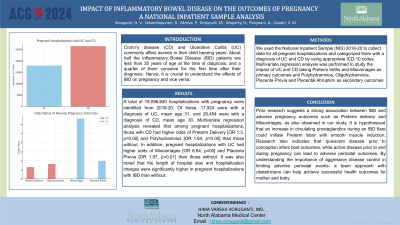Sunday Poster Session
Category: IBD
P0843 - Impact of Inflammatory Bowel Disease on the Outcomes of Pregnancy: A National Inpatient Sample Analysis
Sunday, October 27, 2024
3:30 PM - 7:00 PM ET
Location: Exhibit Hall E

Has Audio

Hima Varsha Varsha Voruganti, MBBS, MD
North Alabama Medical Center
Florence, AL
Presenting Author(s)
Hima Varsha. Voruganti, MBBS, MD1, Rohit Sekandlapuram, MD2, Pratiksha Moliya, MD3, Manasa Ginjupalli, MBBS, MD4, Hamsika Moparty, MD2, Amelia Panjwani, BSc5, Shamsa M. Qaadri, BSc5
1North Alabama Medical Center, Florence, AL; 2The Brooklyn Hospital Center, Brooklyn, NY; 3Jamaica Hospital Medical Center, Edison, NJ; 4The Brooklyn Hospital Center, New York, NY; 5St. George's University School of Medicine, Brooklyn, NY
Introduction: Crohn's disease (CD) and Ulcerative Colitis (UC) commonly affect women in their child bearing years. About half the Inflammatory Bowel Disease (IBD) patients are less than 35 years of age at the time of diagnosis and a quarter of them conceive for the first time after their diagnosis. Hence it is crucial to understand the effects of IBD on pregnancy and vice versa.
Methods: We used the National Inpatient Sample (NIS) 2018-20 to collect data for all pregnant hospitalizations and categorized them with a diagnosis of UC and CD by using appropriate ICD 10 codes. Multivariate regression analysis was performed to study the impact of UC and CD taking Preterm births and Miscarriages as primary outcomes and Polyhydramnios, Oligohydramnios, Placenta Previa and Placental Abruption as secondary outcomes.
Results: A total of 19,096,840 hospitalizations with pregnancy were identified from 2018-20. Of these, 17,924 were with a diagnosis of UC, mean age 31 and 26,454 were with a diagnosis of CD, mean age 30. Multivariate regression analysis revealed that among pregnant hospitalizations those with CD had higher odds of Preterm Delivery [OR 1.3, p=0.00] and Polyhydramnios [OR 1.64, p=0.00] than those without. In addition, pregnant hospitalizations with UC had higher odds of Miscarriages [OR 6.64, p=00] and Placenta Previa [OR 1.97, p=0.01] than those without. It was also noted that the length of hospital stay and hospitalization charges were significantly higher in pregnant hospitalizations with IBD than without.
Discussion: Prior research suggests strong association between IBD and adverse pregnancy outcomes such as Preterm delivery and Miscarriages, as also observed in our study. It is hypothesized that an increase in circulating prostaglandins during an IBD flare could initiate Preterm labor with smooth muscle induction. Research also indicates that quiescent disease prior to conception infers best outcomes, while active disease prior to and during pregnancy can lead to adverse perinatal outcomes. By understanding the importance of aggressive disease control in limiting adverse perinatal events, a team approach with obstetricians can help achieve successful health outcomes for mother and baby.
Disclosures:
Hima Varsha. Voruganti, MBBS, MD1, Rohit Sekandlapuram, MD2, Pratiksha Moliya, MD3, Manasa Ginjupalli, MBBS, MD4, Hamsika Moparty, MD2, Amelia Panjwani, BSc5, Shamsa M. Qaadri, BSc5. P0843 - Impact of Inflammatory Bowel Disease on the Outcomes of Pregnancy: A National Inpatient Sample Analysis, ACG 2024 Annual Scientific Meeting Abstracts. Philadelphia, PA: American College of Gastroenterology.
1North Alabama Medical Center, Florence, AL; 2The Brooklyn Hospital Center, Brooklyn, NY; 3Jamaica Hospital Medical Center, Edison, NJ; 4The Brooklyn Hospital Center, New York, NY; 5St. George's University School of Medicine, Brooklyn, NY
Introduction: Crohn's disease (CD) and Ulcerative Colitis (UC) commonly affect women in their child bearing years. About half the Inflammatory Bowel Disease (IBD) patients are less than 35 years of age at the time of diagnosis and a quarter of them conceive for the first time after their diagnosis. Hence it is crucial to understand the effects of IBD on pregnancy and vice versa.
Methods: We used the National Inpatient Sample (NIS) 2018-20 to collect data for all pregnant hospitalizations and categorized them with a diagnosis of UC and CD by using appropriate ICD 10 codes. Multivariate regression analysis was performed to study the impact of UC and CD taking Preterm births and Miscarriages as primary outcomes and Polyhydramnios, Oligohydramnios, Placenta Previa and Placental Abruption as secondary outcomes.
Results: A total of 19,096,840 hospitalizations with pregnancy were identified from 2018-20. Of these, 17,924 were with a diagnosis of UC, mean age 31 and 26,454 were with a diagnosis of CD, mean age 30. Multivariate regression analysis revealed that among pregnant hospitalizations those with CD had higher odds of Preterm Delivery [OR 1.3, p=0.00] and Polyhydramnios [OR 1.64, p=0.00] than those without. In addition, pregnant hospitalizations with UC had higher odds of Miscarriages [OR 6.64, p=00] and Placenta Previa [OR 1.97, p=0.01] than those without. It was also noted that the length of hospital stay and hospitalization charges were significantly higher in pregnant hospitalizations with IBD than without.
Discussion: Prior research suggests strong association between IBD and adverse pregnancy outcomes such as Preterm delivery and Miscarriages, as also observed in our study. It is hypothesized that an increase in circulating prostaglandins during an IBD flare could initiate Preterm labor with smooth muscle induction. Research also indicates that quiescent disease prior to conception infers best outcomes, while active disease prior to and during pregnancy can lead to adverse perinatal outcomes. By understanding the importance of aggressive disease control in limiting adverse perinatal events, a team approach with obstetricians can help achieve successful health outcomes for mother and baby.
Disclosures:
Hima Voruganti indicated no relevant financial relationships.
Rohit Sekandlapuram indicated no relevant financial relationships.
Pratiksha Moliya indicated no relevant financial relationships.
Manasa Ginjupalli indicated no relevant financial relationships.
Hamsika Moparty indicated no relevant financial relationships.
Amelia Panjwani indicated no relevant financial relationships.
Shamsa Qaadri indicated no relevant financial relationships.
Hima Varsha. Voruganti, MBBS, MD1, Rohit Sekandlapuram, MD2, Pratiksha Moliya, MD3, Manasa Ginjupalli, MBBS, MD4, Hamsika Moparty, MD2, Amelia Panjwani, BSc5, Shamsa M. Qaadri, BSc5. P0843 - Impact of Inflammatory Bowel Disease on the Outcomes of Pregnancy: A National Inpatient Sample Analysis, ACG 2024 Annual Scientific Meeting Abstracts. Philadelphia, PA: American College of Gastroenterology.
